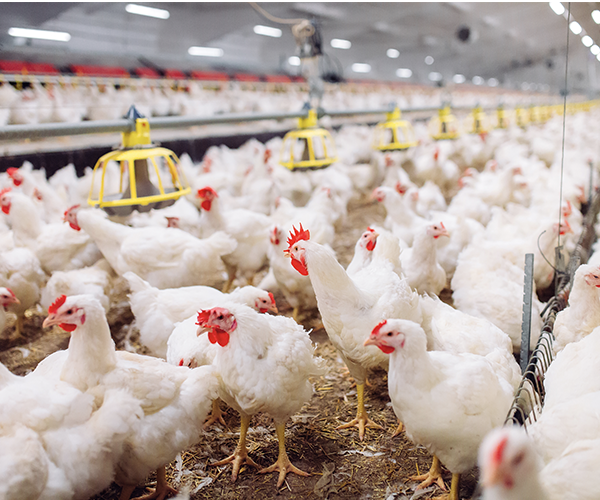“[T]here has never been such a new product on a product as iconic as the nugget,” said McDonald’s France chief marketing officer,” Jean-Guillaume Bertola this week as he announced the arrival of vegan nuggets to the menu at more than 1,500 outlets in the country. “With the Veggie McPlant Nuggets, we are responding to the increasing desire of French consumers to diversify their protein intake while never compromising on taste,” he added.
It is quite a significant move, not least because these nuggets are now a permanent fixture on menus in France. Taste tests among consumers have gone very well indeed. “The response was unanimous, there was a real craze from our consumers who found a strong resemblance to the iconic nugget,” Bertola explained. “We are rather confident about the success of the product,” he added.
The flip from poultry to peas is one that’s intrigued us for some time. Some 850 million chickens are reared for meat in the UK each year, 95% of which is in intensive indoor units (the ones causing pollution issues and damaging biodiversity). They lack taste and have become so commoditised that it’s often hard to tell the difference between chicken and a plant-based alternative – especially when it has been breaded and cooked.
As well as the plant option, there is also the lab-reared one. With higher welfare high on consumer wish-lists, RSPCA Assured in the spotlight for ‘welfare-washing’, and the price of cultured meat coming down, the chances of nudging consumers towards this new technology are improving by the day.
This week there was (very) good news for those invested in cultured meat in the UK: the Food Standards Agency, in collaboration with Food Standards Scotland (FSS), has been awarded £1.6m in government funding to launch a ‘sandbox programme’ for cell-cultivated products (CCPs).
The FSA said the programme “will allow us to recruit a new team to work across the FSA and FSS. They will gather rigorous scientific evidence on CCPs and the technology used to make them. This information will enable us to make well-informed and more timely science and evidence-based recommendations about product safety and address questions that must be answered before any CCPs can enter the market. It will also allow us to better guide companies on how to make products in a safe way and how to demonstrate this to us.”
The programme will run for two years – which led to reports that lab-grown could be on sale here by 2026. Linus Pardoe, senior UK policy manager at the Good Food Institute Europe, which promotes meat alternatives, said: “Cultivated meat could play a key role in boosting food security, driving growth and helping us hit our climate targets. The sandbox is a welcome measure, but to fully realise the potential of cultivated meat, ministers must also provide a long-term boost to the FSA’s budget, enabling regulators to complete robust risk assessments within statutory timeframes.”
In July, lab-grown chicken from cultivated meat company Meatly received UK regulatory approval from the Animal and Plant Health Agency (APHA), the FSA and Defra. Meatly can now sell its lab-grown chicken to approved pet food manufacturers.
The stricter regulatory requirements for humans mean there is still “a way to go” before the UK joins Singapore, US and Israel in approving lab-grown meat for human consumption, said Louise Atkins, a trainee patent attorney with IP firm Mewburn Ellis at the time.
There are certainly technical, financial, environmental, social and political headwinds to face. However, the hype is growing faster than ever. The Grocer reported that the FSA is now expecting a “flood” of applications for lab-grown meat products for human consumption.
GFI and Systemiq this week published new research showing that a scaled-up future cultivated meat industry could deliver significant environmental benefits in the EU by unlocking a wider market for plant-based meat – developing ingredients such as cultivated fat that will improve the taste and texture of plant-based products. This could reduce global greenhouse gas emissions by up to 3.5 gigatons by 2050 (up to 17% of total food system emissions), cut demand for global agricultural land by one-third and conserve 225 million cubic metres of water. They also estimated that the cultivated meat could contribute €20-85bn per year to the EU economy.
But it won’t be easy. “Products need to meet expectations around taste and price, consumers must have strong confidence in cultivated meat’s safety and there must be more public awareness about its climate, nature and food security benefits,” said GFI.
From fake meats we move to farm fakery – and a new campaign aimed at stopping supermarkets using fake farm names on fresh produce. “The current system assumes that we will continue to be able to buy food from around the world and import chemicals to grow what little we do produce. I think that’s changing,” said Riverford founder Guy Singh-Watson, who is leading the new ‘Farmers against farmwashing’ campaign, covered in our other news this week.
There is also a stark warning from WWF, which reported a “catastrophic” average decline in wildlife populations in its biennial Living Planet Report and called for urgent action to transform the way we grow our food, generate energy and run our financial system.












Leave a Reply